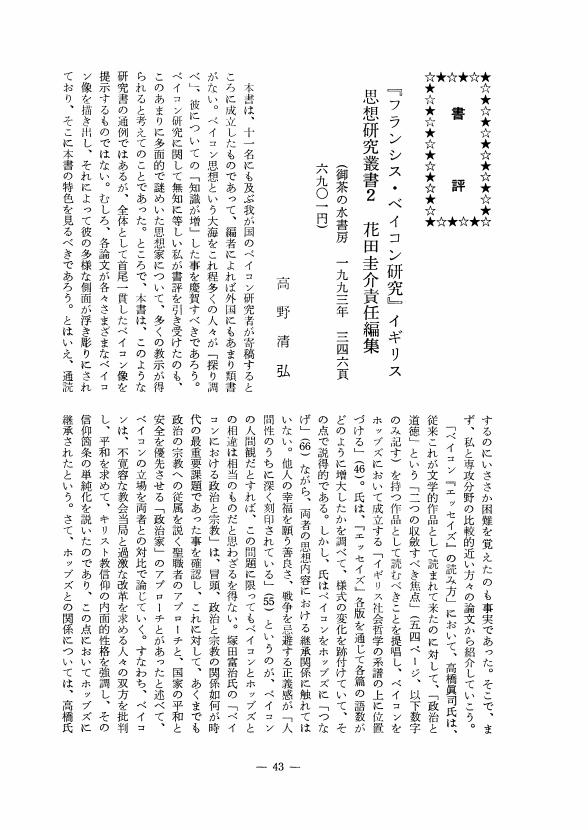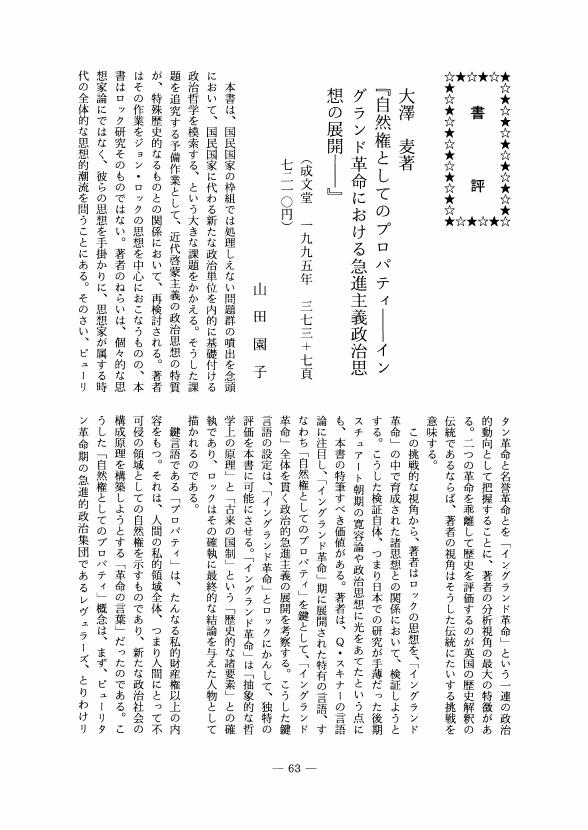- 著者
- 山下 重一
- 出版者
- 国学院大学法学会
- 雑誌
- 国学院法学 (ISSN:04541723)
- 巻号頁・発行日
- vol.41, no.2, pp.37-88, 2003-09
3 0 0 0 OA スペンサーと明治日本 金子堅太郎との往復書簡をめぐって
- 著者
- 山下 重一
- 出版者
- 日本英学史学会
- 雑誌
- 英学史研究 (ISSN:03869490)
- 巻号頁・発行日
- vol.1999, no.31, pp.43-54, 1998 (Released:2009-09-16)
- 参考文献数
- 24
This pager intends to examine the correspondence between Kaneko Kentarô and Herbert Spencer during Kaneko's stay in London in August 1892. Duncan's “Life and Letters of Herbert Spencer” includes three letters of Spencer to Kaneko dated 21st, 23rd and 26th of August, 1892, and London University Library holds a letter of Kaneko to Spencer dated 24th of August, 1892.In these letters, Spencer gave Kaneko very conservative advices, for example, house holder's suffrage, restriction of the National Assembly's function to the non-coercive advice to the government and to prohibition of the foreigner's rights to hold land, to work mines and to engage the coasting trade. He even declared that Japanese government gave “too large an instalment of freedom.” Though it seems curious that Spencer whose books inspired the people's rights movement gave to the Japanese Statesman such a “conservative advice”, it seems to be possible to imagine that Spencer was influenced by the opinion of Mori Arinori, who was intimate with him as a Japanese minister. Mori's draft of Japanese constitution written in 1884 includes some conservative views which Spencer advised to Kaneko eight years later. This paper aims to prove this estimation by examining Mori's views on constitution. Spencer was not a unconditional liberalist, but a gradualist who believed that a political institutions ought to fit to the each stage of social evolution. It seems possible to believe that when he was told by Mori on the low stage of Japanese social evolution, his conservative advices to Japanese government. naturally followed.This paper also includes an examination of the political thought of Baba Tatsui who as an ardent Spencerian, tried to utilize Spencer's theory of social evolution to support the people's rights movement, and a reference to the comments on Spencer's letters by Lafcadio Hearn, who heartly agreed with Spencer's advices to Kaneko.
- 著者
- 山下 重一
- 出版者
- Historical Society of English Studies in Japan
- 雑誌
- 英学史研究 (ISSN:03869490)
- 巻号頁・発行日
- no.33, pp.57-71, 2000
The first Japanese translation of "<I>On Liberty</I>" by Keiu Nakamura was published in Shizuoka in 1872, and the first Chinese translation of the same book by Yen Fu was published in Shanghai in 1903. This paper intends to examine reception of Mill's ideas in modern Japan and China by comparing the two translations of chapter III of "<I>On Liberty</I>" on individuality.<BR>Nakamura and Yen Fu had studied in Englan-the former from 1866 to 1868 and the latter from 1877 to 1879-, and both of them endeavoured to introduce Western ideas to their countries. They learnt from the Mill's book the great importance of liberty of thought and action, especially individuality of thought and mode of life. In chapter III of "<I>On Liberty</I>", Mill emphasized individuality of character, and variety of situations as the conditions of individual happiness and social progress and he preferred active and energetic character to passive and indolent one. Their translations of "<I>On Liberty</I>" clearly reflected their deep sympathy with Mill's ideas <I>On Liberty</I>.<BR>While Mill contemplated the liberty of thought, discussion and mode of life in mid-Victorian England, he was anxious about the approaching mass society which would oppress individuality and variety by enforcing conformity of thought and action. Though Nakamura and Yen Fu were living in quite a different atmosphere, they sincerely accepted Mill's principle of liberty.Nakamura who was an eminent thinker of enlightenment in early Meiji Japan and Yen Fu who was a passionate patriot in semi-colonized China, respectively accepted Mill's idea of individuality as a springboard to enlighten their own nations' energy and morality. Their translations of "<I>On Liberty</I>" were the grand monuments of the reception of Western ideas in Japan and China.
2 0 0 0 OA 書評
2 0 0 0 OA 小野梓とイギリス功利主義の政治思想
- 著者
- 山下 重一
- 出版者
- 日本英学史学会
- 雑誌
- 英学史研究 (ISSN:03869490)
- 巻号頁・発行日
- vol.1996, no.28, pp.1-11, 1995 (Released:2009-09-16)
- 参考文献数
- 26
The Japanese Imperial Government which started in 1868 tried to introduce European political institutions rapidly. Young Japanese statesmen/and scholars went abroad to study European political systems and ideas. Among European and American books on politics, government or law which were translated into Japanese, those of English utilitarians were numerous, Bentham's “Theory of Legislation”, “Morals of Legislation”, “Fragment on Government”, Mill's “On Liberty”, “Representative Government”, “Utilitarianism”, “Political Economy” were translated between 1860's and 1880's.This paper will focus on and analyse Azusa Ono (1852-1885), whose political ideas were strongly influenced by English utilitarians. He studied in New York and London and then became a Japanese bureaucrat. After he resigned his office, his activity as a leader of an opposite party was remarkable. He was also a prolific writer, and in his last book entitled “Kokken Hanron” (“General Theory of Constitution”) were reflected the political ideas of Bentham's “Constitutional Code”, James Mill's “Government” and J. S. Mill's “Representative Government” : Ono insisted that constitutional government should be established in Japan, He admired the British type of parliamentary government, but he tried to modify it by applying Bentham and two Mills' plans for political reforms to it. Though Ono died four years before the opening of the first Japanese parliament, his plan of constitutional government was far more liberal and democratic than Japanese Imperial Constitution. He was one of the distinguished statesmen who gained the insight and perspective in accepting English utilitarian political ideas in early modern Japan.
2 0 0 0 翻訳 J・S・ミルの日記--1854年一月八日〜四月十五日
- 著者
- Mill John Stuart 山下 重一
- 出版者
- 国学院大学法学会
- 雑誌
- 国学院法学 (ISSN:04541723)
- 巻号頁・発行日
- vol.41, no.3, pp.63-92, 2003-12
1 0 0 0 OA 書評
1 0 0 0 OA 書評
1 0 0 0 OA 書評
1 0 0 0 OA 書評
1 0 0 0 IR 土居光華と『東海暁鐘新聞』
- 著者
- 山下 重一
- 出版者
- 國學院大學図書館
- 雑誌
- 國學院大學図書館紀要 (ISSN:09153527)
- 巻号頁・発行日
- no.3, pp.81-93, 1991-03-20
1 0 0 0 OA 小野梓とイギリス政治思想
- 著者
- 山下 重一
- 出版者
- 日本英学史学会
- 雑誌
- 英学史研究 (ISSN:03869490)
- 巻号頁・発行日
- vol.1979, no.11, pp.51-63, 1978-07-01 (Released:2009-09-16)
- 参考文献数
- 34
1 0 0 0 ジョン・ステュアート・ミルとジョン・モーリー
- 著者
- 山下 重一
- 出版者
- 国学院大学法学会
- 雑誌
- 国学院法学 (ISSN:04541723)
- 巻号頁・発行日
- vol.43, no.3, pp.123-182, 2005-12
1 0 0 0 三浦按針(ウィリアム・アダムス)の琉球航海記
- 著者
- 山下 重一
- 出版者
- 南島史学会
- 雑誌
- 南島史学 (ISSN:03896846)
- 巻号頁・発行日
- no.47, pp.1-15, 1996-04
- 著者
- 山下 重一
- 出版者
- 国学院大学法学会
- 雑誌
- 国学院法学 (ISSN:04541723)
- 巻号頁・発行日
- vol.51, no.3, pp.75-118, 2013-12
1 0 0 0 ル-イス「政治的用語の効用と弊害」書評(1832年)
- 著者
- Mill J.S. 山下 重一
- 出版者
- 国学院大学法学会
- 雑誌
- 国学院法学 (ISSN:04541723)
- 巻号頁・発行日
- vol.29, no.4, pp.p53-72, 1992-03
1 0 0 0 シチリア紀行--ミルの足跡を訪ねて
- 著者
- 山下 重一
- 出版者
- 日本古書通信社
- 雑誌
- 日本古書通信 (ISSN:03875938)
- 巻号頁・発行日
- vol.66, no.6, pp.6-8, 2001-06





